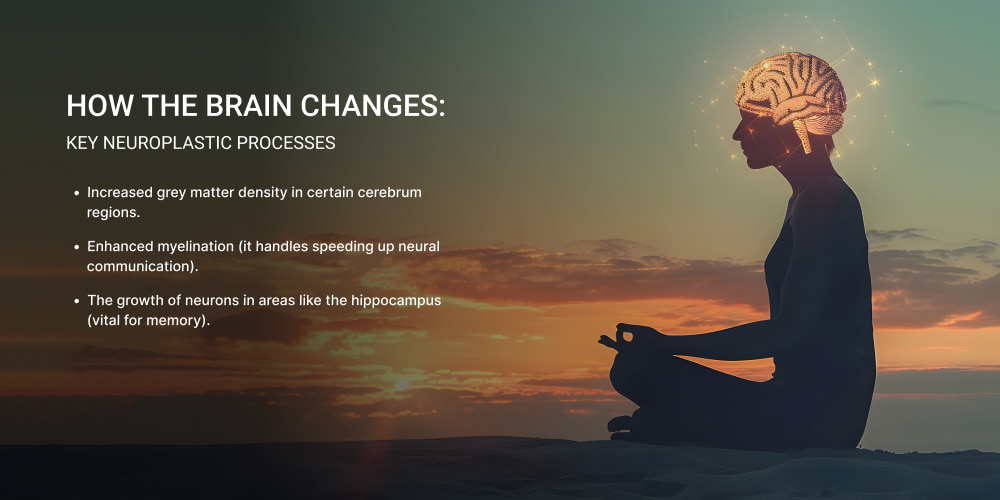In our world, the old practice of meditation has emerged as a beacon of tranquility. Millions have turned to meditation for solace and self-discovery. It’s no longer relegated to monasteries and ashrams. This practice has become part of mainstream culture, embraced by:
- Celebrities
- Athletes
- Everyday individuals
This surge in popularity isn’t merely a fleeting trend. It’s rooted in something far more profound. It’s the remarkable impact of meditation on the very structure and function of our brains.
Neuroscience has begun to unravel the mysteries of this mind-body practice. It reveals that mindfulness is not just a feel-good activity. It’s a powerful tool for reshaping our minds. Through rigorous scientific investigation, researchers are discovering that consistent meditation can:
- Induce significant changes in brain plasticity
- Change its ability to reorganize itself by forming new neural connections
This has profound implications for stress reduction, emotional regulation, and even mental enhancement.
The Science Behind Meditation and Brain Plasticity
Neuroplasticity refers to the brain’s remarkable ability to reorganize itself through the formation of new neural connections throughout life. This dynamic process allows the brain to:
- Adapt to new experiences
- Learn new skills
- Recover from traumas
Historically, it’s believed that the adult brain was largely fixed, but we now know that it’s constantly changing and rewiring itself. This plasticity is crucial for learning, memory, and mental function.
Meditation is a potent catalyst for neuroplasticity. By repeatedly focusing attention and cultivating meditation, it strengthens specific neural pathways. Mental exercise through meditation builds stronger connections between cells. This occurs through several mechanisms. It includes:
- Increased grey matter density in certain brain regions
- Enhanced myelination (it facilitates speeding up neural communication)
- The growth of neurons in areas like the hippocampus (vital for memory)
Many neurology scientific studies have documented meditation-induced brain changes. Research using MRI has shown that regular meditation increases grey matter in the prefrontal cortex. It’s the area responsible for higher-order thinking, decision-making, and attention. Studies have also demonstrated changes in the amygdala. It’s the emotional center, leading to improved emotional regulation.
Also, meditation has been shown to increase the connectivity between different brain regions. It promotes more efficient information processing.
Mindfulness and Its Role in Cognitive Enhancement
This is a specific type of meditation. It involves paying attention to the present moment without judgment. It’s about observing your thoughts, feelings, and sensations. It’s without getting carried away by them. This training cultivates awareness and helps to break the cycle of rumination and worry. It’s like training a muscle for your mind. It strengthens your ability to focus and concentrate.
The benefits of meditation for cognitive enhancement are substantial. By practicing meditation, you train your brain to become more focused and less easily distracted. This practice translates to better memory. It leads to enhanced learning abilities and increased productivity. Studies have shown that mindfulness can improve working memory. It is crucial for holding information in mind and manipulating it. It can also enhance mental flexibility. This is the ability to switch between different tasks or mental sets. Moreover, meditation can improve performance on cognitive tests which measure attention, executive function, and processing speed.
How Meditation Supports Emotional Regulation
meditation helps to cultivate a greater sense of awareness of emotions as they arise. By observing emotions, we can learn to recognize our emotional patterns. This allows for a more thoughtful and less reactive response to emotional triggers.
Meditation helps us maintain a sense of detachment, allowing emotions to pass without causing undue distress. As a result, regular practice can lead to a reduction in anxiety. It leads to improved mood stability and a greater sense of emotional well-being. It empowers us to respond to life’s challenges with greater equanimity.
Meditation as a Tool for Stress Reduction
Chronic stress takes a significant toll on physical and mental health. Neurologically, cortisol is a hormone that triggers the “fight-or-flight” response. However, prolonged cortisol elevation can wreak havoc on the brain. It can impair memory, disrupt rest, and even shrink the hippocampus. This is a region crucial for learning and memory. Stress also activates the amygdala, the emotional center. It leads to heightened anxiety and reactivity.
meditation offers a powerful countermeasure to the neural effects of stress. By cultivating a state of calm and focused awareness, meditation helps to regulate the stress response system. Studies have shown that regular practice can lower cortisol levels. It promotes relaxation and reduces feelings of anxiety. This reduction in cortisol is linked to several physiological benefits. It includes lower blood pressure, improved heart rate, and strengthened immunity.
Meditation also impacts the brain’s structure and function in ways that mitigate stress. It strengthens the prefrontal cortex which helps regulate emotional responses. This communication between the prefrontal cortex and the amygdala allows for a more balanced and less reactive response to stress.
Research using imaging has shown that meditation can decrease activity in the amygdala particularly during stressful situations. It leads to a calmer and more centered response.
Long-Term Cognitive Benefits of Meditation
The benefits of meditation extend far beyond immediate stress reduction and relaxation. Consistent practice can lead to significant long-term mental enhancements. It affects everything from focus and decision-making to the prevention of neurodegenerative diseases. As we age, the brain naturally undergoes changes that can lead to mental decline. It includes decreased grey matter volume and reduced connectivity between brain regions. However, research suggests that meditation can help to mitigate these age-related changes while helping preserve mental function.
Neurology studies have shown that long-term meditation often exhibits greater grey matter density in certain brain areas. It includes the prefrontal cortex and the hippocampus. They’re critical for functions like attention, memory, and executive function.
This suggests that meditation may help to protect against age-related brain shrinkage and maintain mental reserve. Furthermore, meditation has been linked to improved white matter integrity. It refers to the health and efficiency of the communication pathways. Stronger white matter connections facilitate faster and more efficient information processing. It leads to enhanced mental performance.
Beyond structural changes, meditation also impacts mental function at a behavioral level. Long-term meditators often report improved focus, concentration, and attention span. They’re better able to filter out distractions and maintain mental clarity. It translates to enhanced productivity and performance in many tasks. meditation also strengthens decision-making skills. It’s by improving the ability to regulate emotions and think more rationally under pressure. By cultivating meditation and self-awareness, meditation allows us to make more thoughtful decisions. Furthermore, research suggests that meditation may enhance problem-solving skills. It’s by promoting mental flexibility and creative thinking.
Now, more research is needed. However, some studies suggest that mindfulness may play a role in preventing or delaying the onset of neurodegenerative diseases like Alzheimer’s. By promoting plasticity and reducing inflammation, meditation may help to protect against neuronal damage. Although not a cure, meditation may be a valuable tool for maintaining cognitive health and well-being throughout life.
Incorporating Meditation for Brain Health
Integrating meditation into your daily life doesn’t require drastic changes or hours of seclusion. Even short, regular sessions can yield significant benefits for brain health. Start small and gradually increase the duration and frequency of your practice. A good starting point is 5-10 minutes daily. Consistency is key. So try to establish a regular time for your practice. It doesn’t matter if it’s first thing in the morning, during your lunch break, or before bed.
There are many stress reduction techniques that can be beneficial for mental and emotional well-being. meditation, as discussed earlier, involves focusing attention on the present moment without judgment. You can focus on your breath, bodily sensations, or sounds in your environment. Another popular technique is loving-kindness meditation. It cultivates feelings of compassion and goodwill towards oneself and others.
This can be helpful for improving emotional regulation and reducing feelings of negativity. For cognitive enhancement, focused attention meditation can be beneficial. It’s useful for strengthening attention and concentration. There, you concentrate on a single object or sensation. Experiment with different techniques to find what resonates best with you. Guided meditations, available through apps or online resources, can be particularly helpful. It’s especially useful if you are a beginner.
Creating a conducive environment for emotional regulation is also important. Find a quiet space where you won’t be disturbed. You can sit on a cushion or chair, whichever is more comfortable. Close your eyes gently and bring your attention to your breath. When your mind wanders, gently redirect your focus back to your breath. Don’t get discouraged if your mind wanders frequently. This is a natural part of the process. The key is to gently guide your attention back to your chosen focus each time.
As you continue practicing, you’ll likely find it easier to maintain focus and you will experience the benefits of meditation more deeply. Remember, this is a journey, not a destination.













Please, leave your review
Write a comment: